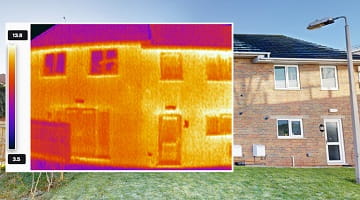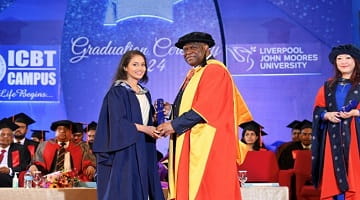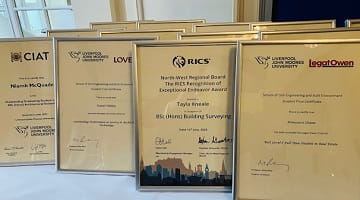Course modules
What you will study on this degree
Further guidance on modules
Modules are designated core or optional in accordance with professional body requirements, as applicable, and LJMU’s Academic Framework Regulations. Whilst you are required to study core modules, optional modules provide you with an element of choice. Their availability may vary and will be subject to meeting minimum student numbers.
Where changes to modules are necessary these will be communicated as appropriate.
Core modules
Construction Project Planning
15 credits
15 credits
Building Technology and Design
15 credits
15 credits
Material Science in Engineering
15 credits
15 credits
Management Studies in Construction
15 credits
15 credits
Civil Engineering Technology
15 credits
15 credits
Fundamentals of Computer Aided Modelling
15 credits
15 credits
Site Surveying in Construction
15 credits
15 credits
Measurement for Construction Works
15 credits
15 credits
Quantity Surveyor in Construction Management and Project Environment
20 credits
20 credits
This module aims to develop your holistic understanding of a modern quantity surveyor's roles, interactions, collaborations, and value propositions throughout construction project lifecycle.
Construction Technology 1
20 credits
20 credits
This module introduces the student to construction techniques associated with building types including building regulations and develops an understanding of the performance of buildings and the influence of materials and workmanship specification on performance.
Introduction to Law
20 credits
20 credits
This module will provide the students with a working knowledge of the legal system and an introduction to the principles of the law including contract, tort and property law.
Digital Built Environment
20 credits
20 credits
This module aims to review state of the art developments in information technology (IT) for architecture, engineering, construction industry; and to discuss how these technologies may shape the current and future of quantity surveying practice.
Measurement 1
20 credits
20 credits
This module establishes the principles and conventions for the quantification of building works and considers their application by the Quantity Surveyor, as part of his/her key role in the economic management of the construction process.
Principles of Economics
20 credits
20 credits
This module aims to provide students with an introduction to economic and management theories and principles with reference to the built environment, property, and society in general.
Core modules
Project Administration and Construction Law
15 credits
15 credits
Management Accounting and Finance
15 credits
15 credits
Fundamentals of Construction Economics
15 credits
15 credits
Advanced Measurements for Construction
15 credits
15 credits
Conversion and Adaptation of Buildings
15 credits
15 credits
Group Project for Quantity Surveyors
15 credits
15 credits
Contractual Procedures for Quantity Surveyors
15 credits
15 credits
Tendering and Estimation for Construction
15 credits
15 credits
Construction Technology 2
20 credits
20 credits
This module aims to introduce construction techniques associated with building services considering sustainable development goals. Students will develop an understanding of the performance of buildings and the influence of materials and workmanship specification on the building performance.
Construction Contract Practice
20 credits
20 credits
This module provides you with a detailed understanding of construction contract law as part of your role as a quantity surveyor.
Design Economics and Life Cycle Value
20 credits
20 credits
In this module you will analyse, and evaluate the influence of changes in design parameters on the life cycle value of a project considering multiple performance metrics and commercial targets.
Construction Procurement
20 credits
20 credits
This module aims to establish an awareness of the project stakeholders, the various procurement options and their associated contracts. You will develop the ability to interpret the particular needs of different client groups to develop relevant procurement strategies and to apply techniques to support the implementation of those strategies ensuring that the project criteria are satisfactorily achieved.
Measurement 2
20 credits
20 credits
This module enables you to refine and extend your abilities in the measurement and quantification of complex buildings. You will also demonstrate knowledge and understanding of implementing construction contract administrative procedures.
Multidisciplinary Project
20 credits
20 credits
In this module you will develop skills necessary to deliver a complex, group research project that fits within a sustainable civil engineering context. This module will enable you to develop the academic and digital literacy skills necessary to perform effectively in a Higher Education context. It will enhance your understanding of the professional subject area, and your skills in team work in a collaborative environment using industry standard collaborative CAD and design tools. It will also develop your understanding of Risk Management, Health and Safety and sustainability.
Fees and funding
Entry requirements
Please choose your qualifications below to view requirements
Grades/points required from qualifications:
Work out how many UCAS points your qualifications are worth using the UCAS Tariff Calculator.
Qualification requirements
Alternative qualifications considered
English language proficiency Grade C or above in GCSE Ordinary Level.
OR
IELTS 6.0 overall with no component below 5.5, taken within two years of the course start date
OR
ICBT Higher Diploma in English
International requirements
Other international requirements
The HD suite of programmes at ICBT provides an excellent example of widening participation in a country where there is not enough University supply to fill the demand for higher education. Students can enter the HD programmes after studying for 13 years in the formal education sector through either having studied for A levels, or having undertaken the Foundation programme after studying for O levels. Other level 3 qualifications will also be considered for suitability for entry to the programmes. For the engineering programmes, students must have studied maths, biosciences and/or technology whereas for Quantity Surveying, any subjects will suffice. Students have been entering these programmes with these qualifications for many years and have been successful in achieving the qualifications.
How to apply
Securing your place at LJMU
Your university life
From accommodation and academic support to clubs and societies. Find out what LJMU has to offer.
Talk to our students
Connect with a current LJMU student for advice and guidance on university life, courses and more.
See what our students are saying
At LJMU we want you to know you're making the right choice by studying with us. You can see what our students are saying about their experience with us through their reviews on the following websites:
Related Links
News and views
Browse through the latest news and stories from the university









The university reserves the right to withdraw or make alterations to a course and facilities if necessary; this may be because such changes are deemed to be beneficial to students, are minor in nature and unlikely to impact negatively upon students or become necessary due to circumstances beyond the control of the university. Where this does happen, the university operates a policy of consultation, advice and support to all enrolled students affected by the proposed change to their course or module.
Further information on the terms and conditions of any offer made, our admissions policy and the complaints and appeals process.









